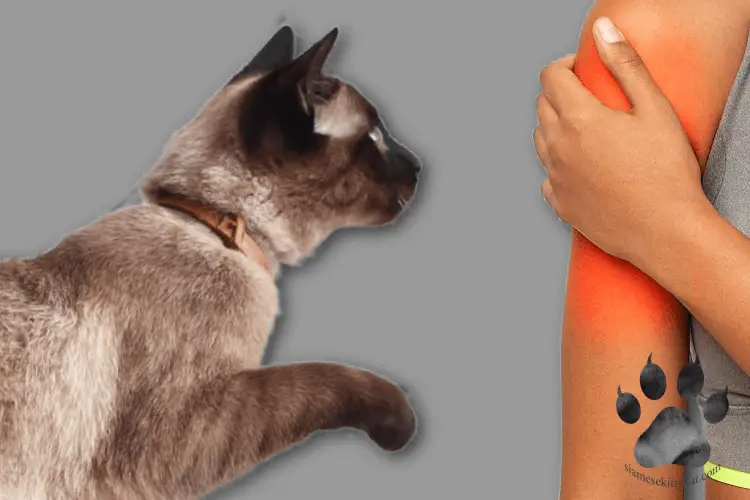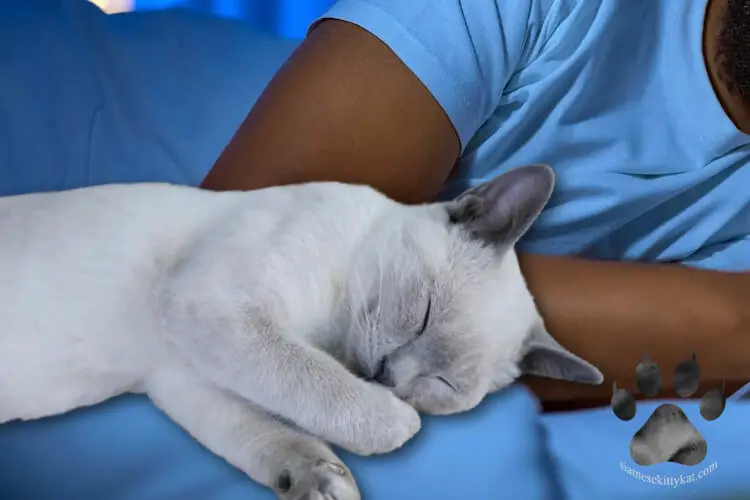Siamese cats are a treat for the eyes, with their striking color points and graceful demeanor. They provide enjoyment, but having them around should not be taken lightly.
Siamese cats can pass on various illnesses to their human owners. This ranges from uncomfortable but harmless conditions to more severe, life-threatening issues.
Thus, it’s best to be aware and take regular preventive measures when owning Siamese cats.
Can a Human Get Sick From a Cat?
Siamese cats are among the most popular household pets in the United States. They are considered friendly and easy to care for, but can also risk their owners’ health.
Siamese cats can transmit various diseases to their owners. This ranges from trivial, common cold, or skin irritation to more serious conditions like rabies. Thus, potential cat owners must know these risks before getting one.
Take precautions if you already have a Siamese cat to reduce your risk of infection. This includes getting regular vaccinations, preventive screening, and avoiding contact with sick animals.
In cases when you are scratched or bitten by your cat, clean the wound and seek medical attention.
Keep your cat’s environment clean and free of potential hazards. Keep food and water bowls clean and routinely disinfect your home’s surfaces.
What Kind of Diseases Can a Cat Give a Person?
1. Rabies
Rabies is one of the deadliest diseases, with an estimated 55,000 people dying yearly. Common carriers of the virus are raccoons, bats, skunks, and foxes. It can also be contracted through domestic pets such as dogs and cats. Rabies is transmitted through the bite of an infected animal. It can also be spread through contact with saliva.
Early symptoms include fever, headache, confusion, or muscle weakness. Severe symptoms, like hallucinations and paralysis, may occur as the disease progresses.
2. Cat scratch disease

Cat scratch disease is a bacterial infection caused by Bartonella henselae. It can be transmitted through scratches or bites from infected cats. The symptoms can vary but may include fever, headache, swollen lymph nodes, and fatigue.
CSD is rare, but still there is a risk of more severe complications. For example, it can affect the brain, eyes, heart, or other internal organs.
People who are most at risk are young children between the ages of 2 and 14, though it can affect people of all ages. More than 80% of cases occur in people younger than 21. CSD usually goes away on its own within two months, but there have been reports of it lasting up to two years.
Most cat scratches are harmless and will not cause cat scratch disease. However, it is still essential to clean any wound caused by a cat scratch with soap and water. Get medical help immediately if your child has experienced any symptoms.
One of the best ways to reduce your risk of getting CSD is by keeping your cat indoors. This limits its exposure to other animals who could potentially transmit the disease. Additionally, avoid scratches, bites, licks from cats, and contact with fleas.
3. Ringworm
Ringworm is a skin infection caused by a dermatophyte fungus. Immunocompromised people, including young children and the elderly, are at risk of ringworm.
Symptoms of ringworm usually start to appear four to fourteen days after contact. The most common symptom is a red, scaly rash with raised edges in a distinct shape resembling a circle or ring.
Your doctor may examine your skin for signs of infection. He may test skin scrapings or nail clippings to confirm the presence of the fungus. Depending on the severity of the ringworm infection, treatment usually involves:
How Do I Know if My Cat is Making Me Sick?
There are a few key things to look for if you think your cat may be making you sick.
1. Pay attention to any changes in your health that seem to coincide with your cat’s presence. Do you suddenly feel tired or have more headaches around your cat? Do you notice that your allergies are acting up more when you’re around your cat? These could be signs your cat is causing your health to deteriorate.
2. Watch for any changes in your cat’s behavior. If your cat becomes more lethargic or stops eating, it may be sick and make you sick as well.
3. Another thing to look for is whether you have any open wounds that your cat has access to. Your cat could be transferring harmful bacteria while licking or biting you. This can lead to serious infections, so it’s essential to keep an eye on any wounds your cat has access to.
See a doctor if you notice these signs as soon as possible. They will be able to determine whether your cat is the cause of your health problems. They will be able to give you the appropriate treatment.
Can Sleeping With a Cat Make You Sick?

There are some potential risks associated with sharing your bed with a cat.
How can I reduce the risk?
To reduce your risk of contracting a zoonotic disease from your cat while sleeping:
Siamese cats are undoubtedly famous for their loyal companionship and playful personalities. Many choose to bring one into their home as it can be a source of happiness. However, be aware of potential health hazards that might come along with owning one.
Siamese cats can transmit many diseases to humans, from minor to severe illnesses. However, these unfortunate events are rare. Siamese cats can remain a source of comfort when you take precautionary steps.
Talking with your vet about preventive measures such as regular vaccinations, grooming, and flea treatment could save you from future health-related concerns.
We gathered all the health tips tailored towards maintaining your Siamese cat’s optimal well-being. Check it out here: Siamese Cat Health: A Complete Guide
